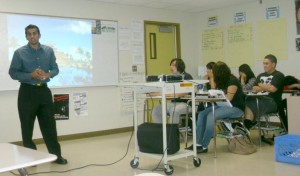Students teach finance to local high school students
Learning how to manage personal finances might not be on the minds of most high school students, but a group of USC students has started a volunteer organization on campus to teach local high schoolers how to do just that.

Money · Chirag Sagar, the founder of USC’s Moneythink, teaches students at Roosevelt High School in Los Angeles how to open a bank account. Teams of two mentors from USC visit a class period once a week. - Photo courtesy of Chirag Sagar
Moneythink is a national organization that sends college mentors into local high school classrooms to teach programs geared toward helping students make smart decisions about their money. The USC chapter was started by a student to help inner-city Los Angeles students, and currently has 10 volunteer mentors teaching in five classrooms.
Chirag Sagar, a junior majoring in business administration and founder of the Moneythink chapter at USC, said the organization empowers urban youth with instruction in “entrepreneurship, financial literacy and financial life skills” in an attempt to teach them skills necessary to effectively manage personal finances. Lessons include how to open a bank account and conduct basic investing strategies to help students who might not learn these skills otherwise.
Teams of two mentors visit a class period once a week for around seven weeks to teach a program focused on either finance or entrepreneurship. Sagar said the high school students respond well to the lessons because they relate better to a college mentor than an adult teacher.
“We provide a network, resources and an opportunity to inner-city kids to become successful,” Sagar said. “We’re trying to help those kids out, motivate them and show them a way to become successful outside of just school itself.”
The Moneythink curriculum focuses on financial skills because most high schools provide little education in that area. Sagar said students can often graduate with little knowledge of how to manage their own finances.
“What we found is only about 35 percent of students are taught financial literacy,” Sagar said. “There’s no financial literacy curriculum in high schools, apart from in about seven to 10 states total. What it comes down to is, 16 – 18-year-olds need to know how to manage their money.”
The organization’s focus on serving more underprivileged schools reflects a larger trend in USC service groups that is evident in programs like the Good Neighbors Campaign and Neighborhood Academic Initiative.
“I’m interested in education, especially with lower-income and inner-city students,” said Jem Jebbia, a junior majoring in business entrepreneurship and Moneythink mentor. “It’s really a perfect way to tie together entrepreneurship and learning.”
Moneythink was initially developed by students at the University of Chicago in September 2008 and has since expanded to 22 universities nationwide, with plans to spread to China and India.
The chapter at USC was officially started in the fall, and more mentors were added this semester, but Sagar had already begun to lay the foundations for the organization when he first got involved in April 2009.
Sagar’s friend Ted Gonder helped to found the program at the University of Chicago and, when Sagar heard about the program, he became interested.
“Then a teacher at Roosevelt High in L.A. found out about his program, called the Financial Education Initiative at the time, and said she wanted it to be in L.A.,” Sagar said. “Ted contacted me and asked if I could do this, so I taught a two-day session. Once I saw the impact that we had, I was committed to creating a chapter at USC.”
Despite the organization’s fledgling status at USC, Sagar sees great potential for the program’s development.
He hopes to double the number of mentors teaching the program from 10 to upward of 20 for next year and to get advisers and professional entrepreneurs involved with the program as well. Ultimately, he wants the chapter to be a self-sustaining organization that can continue after he graduates.
Those involved in Moneythink believe the program will remain successful because of the rewards it provides to the mentors who teach the classes as well as to the students themselves.
“It’s really inspiring to see students respond even just a little bit to what you’re teaching them,” Jebbia said. “The content that we’re teaching is important, but the bigger picture is that we’re there representing college students and USC in general, and they can see that we’ve been successful in pursuing higher education. It’s an open door for them that shows they might be able to do it, too.”

Comments are closed.